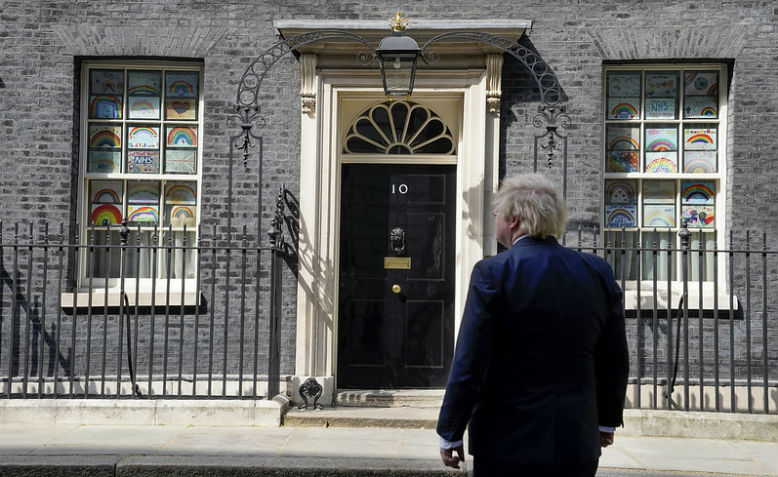 Boris Johnson looks at the NHS rainbow drawings on the window of No10 Downing Street. Photo: Andrew Parsons
Boris Johnson looks at the NHS rainbow drawings on the window of No10 Downing Street. Photo: Andrew Parsons
Michael Roberts takes a look at economic implications of the government’s failures
As I write the UK continues to accumulate the highest number of COVID-19 infections and deaths in Europe, and globally, only behind the US and Brazil. Currently, ‘excess deaths’ in Britain over average annual mortality are around 60,000, or 65% above normal.
From the various revelations, we now know about the incompetence, stupidity and downright callous venality of the Johnson government’s handling of the pandemic. Back in early March, Johnson jovially declared that people would be “pleased to know” that he was shaking hands with everybody at a hospital tending to patients with coronavirus and inviting people ‘to make their own decisions’ about such matters.
But soon, under public pressure, the government was forced to drop its Cummings-driven advice to go for ‘herd immunity’ and instead apply a lockdown, several weeks too late to save, according to some estimates, over 25,000 lives. Subsequently, it has miserably failed to establish an effective test and trace system to control the spread of the virus.
Meanwhile, millions of front-line low-paid workers have been forced to keep the health service functioning, and vital transport, food and deliveries circulating, putting their own health at risk. Less than one in-ten low earners report that they can work from home if needed, compared to half of those on the highest earnings. Four-in-five social housing tenants in employment either work in sectors directly affected by social distancing, have jobs that cannot be performed from home, or are caring for school-aged children.
And there are now millions more laid off, furloughed or working from home, while small businesses are closed, with the likelihood of never opening again. The government has pumped money and credit into the financial system and onto mainly big businesses, while providing limited wage support for households.
Nearly 3m have claimed universal credit top-ups and they need it because over 55% of adults earning less than the national average wage have no savings at all. And soon, even this help to working households will end, while the National Living Wage is at the lowest level in four decades.
The U.K.’s lowest-paid workers are seeing the biggest hit to their pay packets, adding to signs that the coronavirus crisis is widening economic inequality. Britain’s three lowest-income industries all saw wages slump in April: accommodation and food service wages are down 10.8% from a year earlier to an average 224 pounds ($284) per week.
The pandemic is killing people’s livelihoods as well as lives. But more important for the government and business, it is destroying profits. So the lockdowns are being eased even if it leads to a new spread of infections.
The damage is done, however. In April, there was a 19% drop in Britain’s dominant services industry, where sectors such as air transport, travel agents and restaurants lost around 90% of their output. Manufacturing fell 24.3%, while construction plunged 40.1%. It means the UK economy was around 25% smaller in April than it was in February and back to the level of 2002.

The world economy has contracted more deeply and rapidly than in the Great Recession of 2008-9. And, in particular, it has hit a service-based rentier economy like Britain. According to the OECD, the UK economy will suffer the most in the whole world, declining 11.5% in 2020 (while China and Korea will suffer the least).

Britain will suffer the most contraction for more than 300 years!

As the lockdowns end, the already weak UK economy is unlikely to manage a V-shaped rally, especially with a ‘hard Brexit’ approaching. Historically, low growth has persisted in the UK after recessions, because there is permanent ‘scarring’. On average, UK GDP ends up being 14% below its previous five-year trend. And there is even less reason to assume that this time is different.
Before you go
Counterfire is growing faster than ever before
We need to raise £20,000 as we are having to expand operations. We are moving to a bigger, better central office, upping our print run and distribution, buying a new printer, new computers and employing more staff.

